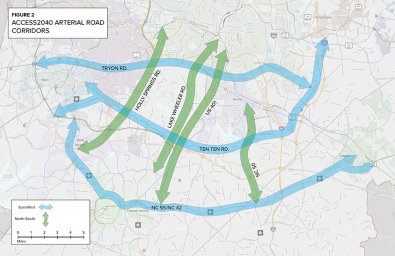N.C. toll road alternatives south of Raleigh would save time, money
By upgrading existing road networks, North Carolina could implement a cheaper, less damaging alternative to the proposed, tolled extension of 540. This conclusion, along with other findings, is part of an expert report released today by SELC following analysis of options to alleviate congestion in Southeastern Wake County. The state has proposed a $2.2 billion toll road many find problematic. As the Raleigh area faces increasing development pressures, planning for transportation options that effectively and affordably connect all residents to jobs, health care, education and loved ones takes on increasing importance.

Upgrades a better option
Upgrades a better option
By improving the key corridors identified above, drivers in southeast Wake County, near Raleigh, would see improved traffic times without paying twice for a $2.2 billion toll road.
The alternative solution, known as ACCESS2040, is outlined in the repot of expert transportation engineer Walter Kulash. The plan would upgrade existing roads and implement innovative transportation improvements to reduce congestion throughout the area considered by the state’s proposed extension of 540, including widening key north-south and east-west road corridors in Southeastern Wake County. ACCESS2040 would cost just $293.7 million above already-planned improvements in the area, compared to the $2.2 billion price tag accompanying the 540 extension proposal. And, unlike the 540 extension, the upgrades would be open to all — not just those willing and able to pay a pricey toll.
The North Carolina Department of Transportation’s proposed toll road would pave over 60 acres of wetlands, cross more than 55,000 feet of streams and cut through habitat essential to rare and endangered aquatic species. ACCESS 2040 would avoid this devastation and instead help preserve the area’s natural beauty.
In addition, NCDOT’s own data indicate that this alternative plan would outperform the $2.2 billion Complete 540 in reducing traffic congestion on existing roadways in Southeastern Wake County, currently a source of commuter frustration.
“NCDOT’s proposed toll road improves travel times for a very few drivers and is actually projected by the state to make congestion on existing highways worse,” said attorney Kym Hunter. “The negligible time-savings cannot justify the multi-billion dollar cost. Importantly, ACCESS2040 would save time for all drivers in the area, regardless of their ability to pay a toll, and at a much lower overall cost.”
Alternative, incremental solutions such as those outlined in the expert report are better suited to take advantage of fast-changing transportation and development trends, such as autonomous vehicles and ride-sharing, and set the stage for economic investment opportunities that come hand-in-hand with a greater emphasis on walkable, bikeable vibrant communities, rather than sprawl. Large companies like Amazon and Apple have been clear that they value these qualities as they search for a new headquarters.
SELC commissioned the report on behalf of conservation groups Sound Rivers and Clean Air Carolina. These groups have long-advocated for a common-sense, affordable, and accessible solutions to Wake County’s transportation needs instead of the expensive and environmentally-damaging toll road pushed by NCDOT. ACCESS2040 provides such a solution.
